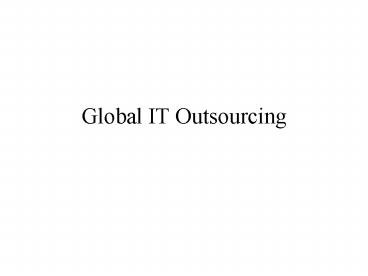Global IT Outsourcing - PowerPoint PPT Presentation
1 / 22
Title:
Global IT Outsourcing
Description:
Potential loss of confidential company information ... Determine viability of vendor. Should not go bankrupt during the outsourcing period ... – PowerPoint PPT presentation
Number of Views:50
Avg rating:3.0/5.0
Title: Global IT Outsourcing
1
Global IT Outsourcing
2
What is Global Outsourcing?
- Migration of white-collar IT jobs to overseas
technology firms - The average value of an IT outsourcing contract
is 47 million (Gartner Group, May 2003) - By 2005, spending is likely to top 260 billion
- Source ARIASYS
3
Areas covered by IT outsourcing
- Information Processing services
- Highly structured and routine
- Little interaction required between outsourcer
and vendor - Includes payroll, claims and credit card
processing - 60 of all IT outsourcing spending worldwide
4
Outsourcing Areas
- Contract programming
- Covers software development and maintenance
- Includes design, testing, porting, and conversion
- Wages in Philippines may be a fifth of those
offered to US programmers
5
Other Outsourcing Areas
- Facilities Management
- Entire operation and support of system is placed
in the hands of a vendor - Covers hardware, software, networking, and
personnel - EDS is dominant in this area
6
Other outsourcing areas
- Systems Integration
- Covers entire SDLC from design to implementation
- Sometimes referred to as turn-key projects
- Support operations
- Specialized services
- Includes maintenance, training, help desk
support, PC support
7
Advantages of IT Outsourcing
- Cost Reduction
- Wages much lower outside the US
- Reduced need for IT people nice in tight IS
market - Predictability
- Cost overruns become responsibility of the vendor
- Vendor contractually required to meet deadlines
8
Advantages of Outsourcing
- Improved focus of current IT staff
- With daily, mundane issues taken care of, IT
staff can focus on strategic issues - Access to cutting-edge technology
- Know-how not always available in-house
- E.g. SAP implementation at Perdue Farms by Price
Waterhouse Coopers
9
Outsourcing Advantages
- Increased availability of outsourcing vendors
- No longer dominated by just a few consulting
companies - In 1996, IBM, EDS, and CSC represented 65 of the
outsourcing revenues - Now many small to mid-size IT firms with PC and
networking skills
10
More Advantages
- Easy (relatively) method to create a global
network - Vendors may have branches in many countries
- Access to global pool of skilled IS personnel
- Access to foreign markets
- A means of bypassing local protectionist policies
11
Some Disadvantages
- Coordination of activities
- Potential loss of confidential company
information - Vendors with access to system may offer systems
specs to competitors - Lack of control over software quality control
- Lack of control over project timetable
- Role of government in controlling transborder
data flows (TDFs)
12
Disadvantages
- Perceived threat to outsourcers own IT
department - Perceived irreversibility of outsourcing decision
- Outsourcers potential loss-of-touch with
technology
13
So, when do you outsource?
High
Strategic value of IT In organization
Low
High
Low
Organizations IS capabilities
14
So, when do you outsource?
High
Insource
Strategic value of IT In organization
Low
High
Low
Organizations IS capabilities
15
So, when do you outsource?
High
Insource
Strategic value of IT In organization
Outsource
Low
High
Low
Organizations IS capabilities
16
So, when do you outsource?
High
Strategic partnership
Insource
Strategic value of IT In organization
Outsource
Low
High
Low
Organizations IS capabilities
17
So, when do you outsource?
High
Strategic partnership
Insource
Strategic value of IT In organization
Establish spin-off to offer function in
marketplace
Outsource
Low
High
Low
Organizations IS capabilities
18
When choosing a vendor
- Check their track record
- Determine human and technology resources at
vendors disposal - Determine viability of vendor
- Should not go bankrupt during the outsourcing
period - CMM Level?
19
Software Capability Maturity Model
- Describes the principles and practices underlying
software process maturity - Intended to help software organizations improve
the maturity of their software processes in terms
of an evolutionary path from ad hoc, chaotic
processes to mature, disciplined software
processes
20
5 Levels of CMM
- 1) Initial. The software process is characterized
as ad hoc, and occasionally even chaotic. Few
processes are defined, and success depends on
individual effort and heroics. - 2) Repeatable. Basic project management processes
are established to track cost, schedule, and
functionality. The necessary process discipline
is in place to repeat earlier successes on
projects with similar applications. - 3) Defined. The software process for both
management and engineering activities is
documented, standardized, and integrated into a
standard software process for the organization.
All projects use an approved, tailored version of
the organization's standard software process for
developing and maintaining software. - 4) Managed. Detailed measures of the software
process and product quality are collected. Both
the software process and products are
quantitatively understood and controlled. - 5) Optimizing. Continuous process improvement is
enabled by quantitative feedback from the process
and from piloting innovative ideas and
technologies.
From Carnegie Mellons SEI Website
21
Other issues to keep in mind
- Stability of host country
- Attitude of host country to FDI and
collaborations - Foreign currency restrictions
- Mostly in case of a spin-off can the revenues be
repatriated? - Size of IS professionals pool
- Telecommunications infrastructure
- Time zone differences
22
(No Transcript)































